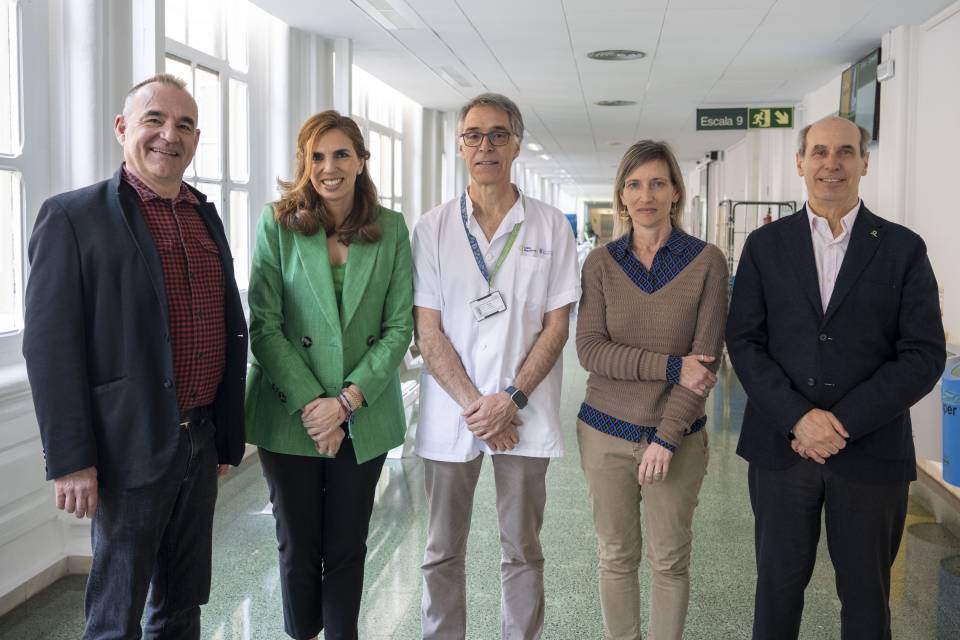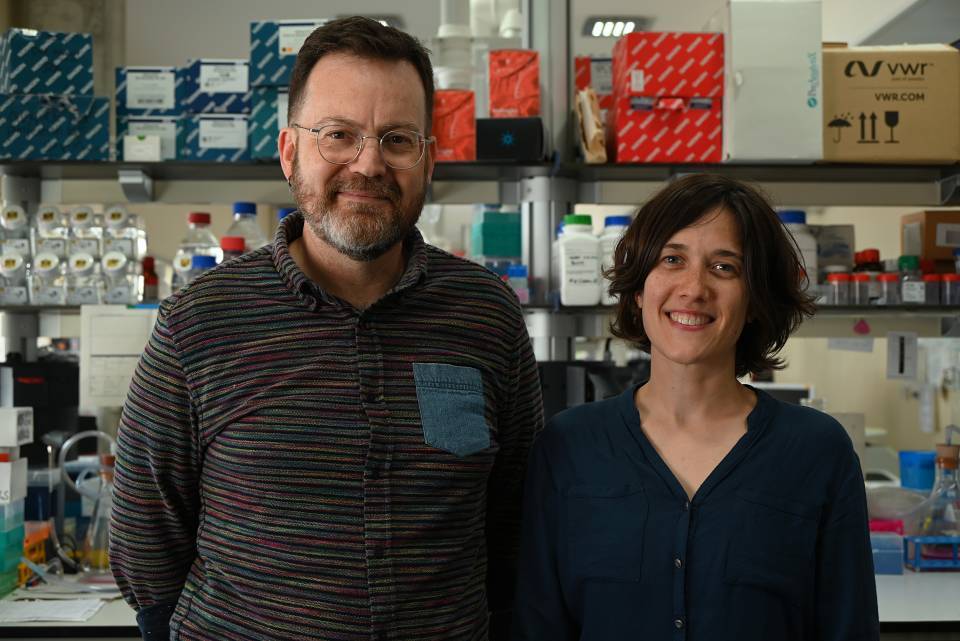- What is it?
- Causes
- Risk factors
- Symptoms
- Prevention
- Diagnosis
- Treatment
- Evolution of the disease
- Living with disease
- Research lines
- Frequently Asked Questions
Frequently Asked Questions about Colorectal cancer
Anyone, male or female, can develop colon cancer or rectal cancer. If there is no family history of colorectal cancer, then the age of presentation is usually from 50 onwards (the mean age is 65–70 years). When there is such a family history, then the age of diagnosis may be younger. These circumstances demonstrate that both environmental and genetic factors are involved in the appearance of colorectal cancer.
Only 5–10% of colon tumours are hereditary cancers. The most common hereditary form is called Lynch syndrome and is caused by an inherited mutation in the MLH1, MSH2, MSH6 or PMS2 gene. The presence of tens of thousands of polyps (adenomas) in the colon is called familial adenomatous polyposis and it is usually caused by the APC and MUTYH genes. Other, less common hereditary forms are serrated polyposis, Peutz-Jeghers syndrome and juvenile polyposis.
Patients with hereditary colorectal cancer must undergo check-ups in special units specifically for individuals with a high risk of colorectal cancer. Certain characteristics in the disease’s presentation, coupled with a family history, can provide warnings about the presence of a hereditary form: the presentation of colorectal cancer at an early age; several cases of cancer in the same person; several relatives with colorectal cancer; diagnosis of colorectal cancer or other related tumours (particularly cancers of the cervix, ovaries, stomach, urinary tract, pancreas and brain).
Symptoms suggesting the suspicion of colon or rectal cancer and which mean you should visit the doctor are the presence of blood in stools, abdominal pain and changes in bowel movement rhythm, without any justifiable reasons, especially in people aged over 50.
Polyps are abnormal growths in the lining of the bowel that are generally benign (non-cancerous). They vary in size, from a small point up to several centimetres. A benign polyp cannot always be distinguished from a malignant one (cancerous) by their external appearance, thus they are removed during the colonoscopy to be analysed.
Due to the fact that cancer starts with polyps, to remove them is the best means that we have of preventing colorectal cancer.
No. The appearance of colorectal polyps in individuals aged over 50 is a common finding. However, it is estimated that only 5% of all polyps eventually degenerate into colorectal cancer. The polyps known as advanced adenomas are most likely to progress further; they measure over 1 cm or present specific histological characteristics (the presence of high-grade dysplasia or a hairy appearance).
The polyps can be removed with biopsy forceps (for very small polyps) or with a wire loop (polypectomy snare). The wire loop is passed through the working cannula of the colonoscope, is placed around the polyp and is closed, producing a clean cut in the surface of the intestinal wall. In the case of polyps larger than 8 mm or with a pedicle, an electric current is usually applied through the loop to cauterise the margins and vessels that feed the polyp. In the case of flat polyps, physiological saline is usually injected beneath the polyp before performing the polypectomy. This operation should cause no pain.
Yes. Patients who have had high-risk colorectal polyps (≥ 3 polyps, and/or ≥ 1 cm, and/or presence of high-grade dysplasia, and/or with a hairy appearance should receive surveillance colonoscopies to detect the appearance of any new polyps. The interval between colonoscopies depends on the number of polyps observed and their histological characteristics.
In most cases (70–75%) colorectal cancer is sporadic, in other words, it is not caused by mutations in the genes inherited from our parents. In 5% of cases the cancer is hereditary, we know which gene causes the disease and the chance of relatives suffering from colorectal cancer is very high. However, in 20–25% of instances of colorectal cancer there are also relatives with the same tumour but the genetic cause is unknown (this situation is known as “familial colorectal cancer”). Under these circumstances the direct relatives of individuals who have suffered colorectal cancer are known to have a greater risk of developing this tumour and so they recommended taking part in colonoscopic screening. The age to begin screening and the time between examinations depend on the age of the relative when they were first diagnosed with colorectal cancer, the number of relatives affected and the degree of kinship. For example, the children and siblings of a patient first diagnosed with colorectal cancer at the age of 65 are advised to start colonoscopic screening at the age of 40 and, if it is all clear, repeat them every 10 years.
Laparoscopic surgery is a minimally invasive surgical technique in which the surgeon uses special fibre optics and specific instrumentation to carry out keyhole surgery instead of what was previously open surgery. The technique has minimised pain and breathing difficulties associated with open techniques, improved aesthetic results and it means patients recover more quickly. Furthermore, the oncological results and survival outcomes are the same as those obtained via conventional surgery.
Not all colorectal surgery necessarily involves a colostomy/ileostomy. The need to open a stoma for tumours located in the ascending, transverse or descending colon is case-specific and depends on the tumour’s extension (unresectable tumours in bowel-obstructed patients) or dehiscence of the anastomosis (in this case, the stoma is temporary and will be reconstructed when the patient has recovered).
With respect to rectal surgery, the indications for opening a stoma are the same as those for the ascending and descending colon, but in this case it is also indicated to protect rectal anastomoses as they have a greater risk of complications.
If you have undergone colon cancer surgery and the lymph nodes examined in the surgical specimen are negative (there must be at least 12), then it is unclear whether chemotherapy is of any benefit. When the nodes are affected by cancer, or less than 12 nodes could be examined, then yes, patients are recommended adjuvant (postoperative) treatment which usually lasts for 6 months. In the case of metastasis, then chemotherapy is almost always indicated. Chemotherapy may not be included in recommendations for patients with a poor overall condition, those aged over 85 years or elderly patients with severe associated diseases.
It is unclear which is better; continuous treatment or chemotherapy over a limited period (3–4 months). This point is currently under investigation, especially in the subgroup of incurable patients with no disease-related symptoms.
We know that people quickly acquire resistance mechanisms to chemotherapy, but we do not know why or which are the most important mechanisms forming part of this resistance.
Radiotherapy is used to treat patients with rectal cancer. It is combined with chemotherapy in a treatment than usually lasts for 5 weeks. This therapy is generally applied before the surgical intervention.
Yes, but anti-EGFR antibody therapies, such as cetuximab and panitumumab, are only indicated in patients with wild-type RAS colorectal cancer (with no mutations in their RAS genes) as it is only beneficial in these cases.
No. Individuals who can benefit from surgery are patients with late metastases (cancer spread that appears 12–24 months after initial surgery on the primary tumour), less than four liver lesions or which are lower than 5 cm.
Yes, without a doubt. Patients who receive colon surgery may present changes in the consistency and frequency of bowel movements, but this can be treated with medications and/or special diets.
The prognosis for colorectal cancer mainly depends on the cancer stage at the time of diagnosis. As a rule, patients are cured of early stage tumours (stage I or II according to the TNM system). The prognosis is worse in more advanced tumours, basically because nearby lymph nodes have been compromised (stage III); nevertheless, the chances of survival are still greater than 50%. By contrast, when the tumour has already led to distant metastasis (stage IV), then the survival rate is lower.
Chemotherapy for colorectal cancer does not usually cause alopecia (hair loss), nausea or vomiting. However, the different medications administered to treat colon or rectal cancer each have their own specific side effects. Capecitabine can cause oedema and redness on the soles of the feet and palms of the hands. It can also cause diarrhoea and, on rare occasions, mouth ulcers (mucositis). The combination of fluorouracil and oxaliplatin (FOLFOX) can also produce of mucositis, diarrhoea, fever and numbness in the hands and feet (neuropathy). The combination FOLFIRI can produce diarrhoea and a greater degree of alopecia than FOLFOX, but it does not cause neuropathy. Bevacizumab can increase blood pressure, while panitumumab and cetuximab may cause skin rashes.
No, it is still unclear whether KRAS gene mutations are associated with a worse prognosis for colorectal cancer.
Although the exact effect of making dietary changes in attempts to prevent colorectal cancer is still unknown, recommendations include moderating the consumption of red meats, processed meats and very well-done meats, or which have been in direct contact with flames, while following a low-fat diet rich in fibre, fruits, vegetables, milk and dairy products.
Yes. In addition to a healthy diet and lifestyle, colorectal cancer screening (to detect polyps or early stage colorectal tumours before the appearance of any symptoms) is very effective in preventing the cancer’s appearance, or increasing the chances of being cured if colorectal cancer is detected.
Substantiated information by:




Published: 20 February 2018
Updated: 20 February 2018
Subscribe
Receive the latest updates related to this content.
Thank you for subscribing!
If this is the first time you subscribe you will receive a confirmation email, check your inbox


